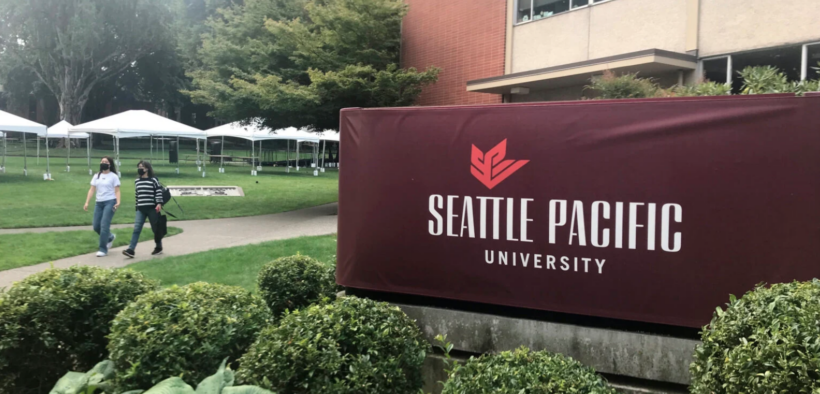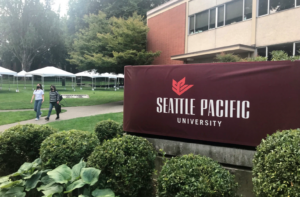Seattle Pacific University Under Scrutiny Again Regarding LGBTQ Displays
The new display policy permits freedom of expression within faculty and staff offices.

(RNS) — Half a mile from the entrance to Seattle Pacific University, a massive billboard with a rainbow LGBTQ flag and the words “all are welcome” looms over a bustling intersection.

Students walk on the campus of Seattle Pacific University in Seattle on Sept. 11, 2022. (AP Photo/Chris Grygiel)
The billboard — placed by Pacific Lutheran University, a school that condones LGBTQ lifestyles about an hour south in Tacoma, Washington — is viewed by some as an intentional jab at SPU and its policies regarding gender and sexuality. In the past three years, the university, which is associated with the Free Methodist Church, has seen lawsuits, student sit-ins and rainbow-flag graduation protests against the university board’s stance on gender and sexuality for employees.
Now, a new display policy for faculty and staff at the college says the university may “restrict expression” that is “incompatible with the mission and functioning of the University,” including displays that are attached to windows and building exteriors. It also gives the university the right to remove displays in violation of the policy without prior notice.
The new policy, according to students and faculty who oppose it, is targeting the pro-LGBTQ paraphernalia that has adorned numerous faculty windows and other areas of campus over the last three years.
Christopher Hanson, director of music education and the only faculty member at SPU who openly identifies as queer, told Religion News Service his office door is “littered” with LGBTQ “propaganda.” He described himself as the “right kind of queer, quote unquote” to pass the board’s policies, because he says he identifies as bisexual and is married to a woman.
Bill Purcell, professor of communication at SPU, sees the new policy as part of a larger pattern of conservative churches drawing a line in the sand on theological and social issues. He said administrators likely adopted the policy to realign the university with what they perceive as the values of the Free Methodist Church.
The policy was announced in July in an email sent to staff and faculty by Kim Sawers, vice president for business and finance. The email said no materials would be removed while faculty were away from campus for the summer. As of Thursday, Sept. 28, none of the faculty, staff or students reached by RNS had heard of displays being taken down.
“No one is going around randomly removing things,” Sawers told RNS. “Policies are meant to guide, and have consistent understanding and shared understanding. There are not display police coming around. That’s not what this is at all.”
The policy doesn’t mention LGBTQ paraphernalia by name, leading to some confusion among faculty about what exactly is or isn’t allowed. But others view the policy’s ban on window displays and materials that violate the school’s mission as a direct reference to pride flags and pro-LGBTQ signs and banners.
Access to MinistryWatch content is free. However, we hope you will support our work with your prayers and financial gifts. To make a donation, click here.
“The way that I interpreted it, it felt like it targeted specifically those types of posters,” said Nikka Dellosa, a staff member in the health and wellness department who designed signs with pride flags and phrases like “Christians love LGBTQIA+ people” and “SPU is not the board” that have been widely shared around campus.
Antonio Nevarez, a sophomore and student journalist at SPU who reported on the policy, pointed out that its definition of “display” is extremely broad and includes chalking, graffiti, electronic images and electronic signatures.
“There’s a lot of faculty and students, including myself, who, at the bottom of our emails have a signature that’s an affirming statement and shows alliance to the queer community here,” said Nevarez. “The fact that they also limit electronic signatures felt almost like a slap in the face.”
In a conversation with RNS, Sawers clarified that the policy prohibits pride flags from being displayed in external-facing windows and in common spaces like hallways or bulletin boards, but allows faculty and staff to display symbols and materials of their choice within their offices.
“This policy is very consistent with what every other institution had,” said Sawers. “And the thing that I like about it is its freedom of expression within offices. Within a faculty or staff member’s office, they can still display symbols that they feel communicate support to different groups.”
Sawers added that the policy is intended to address physical spaces and said she is not sure why electronic signatures are listed.
According to Dellosa and Purcell, some faculty and staff have already removed or altered pro-LGBTQ displays in light of the policy, though Nevarez said there are still “huge pride flags” around campus.
Hanson, who, in addition to the displays on his office door, has a progress pride flag and a poster saying “Support SPU Plaintiffs” in his window, said he has no plans to take any of it down.
Sawers told RNS that supervisors are responsible for enforcing the policy and added that responses to violations should begin with conversations exploring how employees can express their views within the bounds of the policy.
There’s been some student pushback to the policy on social media, but Nevarez said he hasn’t seen any student responses on the ground, though he expects that could change if displays are forcibly taken down.
In July, Guillot v. Whitehead was settled after a judge denied most claims against the university board in April. In an Instagram post, plaintiffs cited insufficient funds to continue the lawsuit.
“We settled, but nothing actually changed,” said Dellosa, a plaintiff in the lawsuit. “We didn’t win anything, SPU, the board of trustees didn’t win anything. I think we were all just really tired and wanted it to end.”
Purcell and Hanson added that over the summer, the university reduced its faculty by 40% to cut costs. Hanson is one of the casualties of the cuts — his current contract ends in June. Purcell said the biggest reason for budget constraints has been a shrinking student body, which he attributed to the convergence of COVID-19, the dip in college-age students in general and “the fact that the university has chosen to be quite muscular” in its response to LGBTQ activity on campus.
“I think the university … will have to make adjustments and decide how long they want to hang their cross on this particular issue,” said Purcell.
Dellosa, who told RNS she is the only openly queer staff member on campus, said that for now, she’s chosen to stay at SPU.
“I think that effective change happens from within,” said Dellosa. “There’s a group of us that are still dedicated to that change.”



